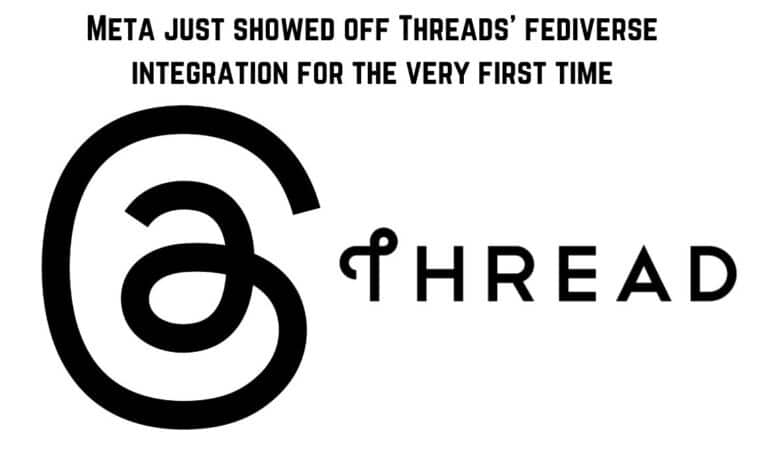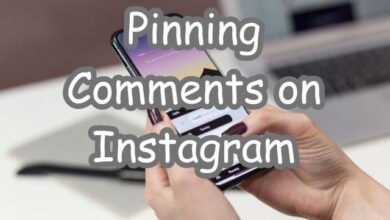Meta just showed off Threads’ fediverse integration for the very first time

Meta just showed off Threads’ fediverse integration for the very first time, marking a significant milestone in the realm of social media. This groundbreaking move by Meta, the tech giant formerly known as Facebook, signifies a new era of interconnectedness and interoperability.
Threads, a product of Meta, is now integrated with the Fediverse, a decentralized and open network of social platforms. This integration is not just a technical enhancement; it’s a paradigm shift in how we perceive and engage with social media platforms.
In this article, we delve into the specifics of this integration, its implications, and what it means for the future of social media.
Background
Meta, formerly known as Facebook, has been a pioneer in the realm of social media, constantly pushing the boundaries of what’s possible. One of their latest ventures is Threads, a product designed to foster more intimate and meaningful connections among users.
The Fediverse, on the other hand, is a decentralized network of social platforms that allows different services to interact with each other. It’s a revolutionary concept that promotes interoperability and freedom, breaking away from the traditional, centralized model of social media.
Recently, Meta made headlines by announcing the integration of Threads with the Fediverse. This integration is a significant step forward, as it allows users to share their Threads posts across different platforms, reaching multiple audiences at once.
This move by Meta is seen as a strategic one, aimed at expanding its user base and influence. By integrating Threads with the Fediverse, Meta is essentially opening up its platform to a wider audience, breaking down barriers, and promoting a more inclusive and interconnected social media landscape.
However, this integration is not without its challenges. For one, there are concerns about privacy and data security, given the decentralized nature of the Fediverse. Moreover, there are also questions about how this integration will impact the dynamics of the social media landscape and whether it will lead to a monopolization of the Fediverse.
Despite these challenges, Meta’s move is seen as a bold and innovative one. It’s a testament to their commitment to evolve and adapt in response to the changing needs and preferences of their users.
Meta’s Announcement
In a significant stride forward, Meta recently made headlines by unveiling the integration of Threads with the Fediverse, a decentralized social networking ecosystem. This momentous announcement took place during the FediForum conference, where Meta’s representative, Peter Cottle, provided a glimpse into how users will soon be able to seamlessly link their accounts and posts to the Fediverse.
This integration marks a pivotal moment as it empowers users to effortlessly share their content across various platforms via Threads, thereby extending their reach to diverse audiences simultaneously. Such a development heralds a significant leap towards fostering a more inclusive and interconnected social media sphere, dismantling barriers in the process.
Nevertheless, the integration does come with certain caveats. For instance, users must have a public profile to access this feature. Additionally, participants in the current alpha test are restricted from viewing replies to their posts, with only visibility into the likes garnered. Meta is actively addressing these limitations, striving to enhance user experience.
Furthermore, Meta cautions that while Threads facilitates post deletion, it cannot ensure removal from other linked platforms within the Fediverse. Therefore, even if a user deletes a post on Threads, it may persist on associated Mastodon servers, highlighting the complexities of cross-platform integration.
Once fediverse sharing is enabled, users will gain the ability to post to other services interacting with ActivityPub. However, before dispatching a message to the Fediverse, Threads will institute a five-minute delay, affording users a window to review and potentially modify their content.
Despite these challenges, Meta’s decision to venture into the Fediverse is lauded as bold and innovative, emblematic of their dedication to evolving and accommodating the evolving needs and preferences of their user base. This move underscores Meta’s commitment to staying ahead of the curve in the dynamic landscape of social media.
Deep Dive into the Integration
Meta’s recent integration of Threads with the Fediverse is a fascinating technological achievement that has been in development for some time now. This integration allows users to effortlessly share their posts across different platforms via Threads, effectively reaching diverse audiences simultaneously.
To activate this feature, users simply navigate to their Threads account settings and toggle on the “fediverse sharing” option. Meta provides a helpful pop-up explanation about the Fediverse and includes some disclaimers to ensure users understand the implications.
A crucial technical aspect of this integration is the utilization of the ActivityPub protocol. Introduced in 2018, this protocol facilitates interoperability between various social networks within the federated constellation of open networks collectively known as the Fediverse.
However, there are specific prerequisites for users to access this integration. They must have a public profile to enable the feature. Additionally, participants in the current alpha test are unable to view replies to their posts, only seeing the likes they receive. Meta is actively working to address this limitation.
Another technical hurdle is that Threads cannot guarantee the deletion of a post on other linked platforms if a user deletes it on Threads. Consequently, a deleted post may still be visible on a connected Mastodon server, despite deletion on Threads.
Despite these technical challenges, Meta’s initiative is regarded as bold and innovative. It underscores their commitment to evolve and adapt in response to the evolving needs and preferences of their user base, showcasing Meta’s proactive approach in navigating the dynamic landscape of social media.
Impact on the Industry
Meta’s integration of Threads with the Fediverse marks a monumental shift in the social media landscape, potentially reshaping how we connect and share content online. This move, which enables users to seamlessly share posts across different platforms, reflects Meta’s aim to foster a more inclusive and interconnected online community.
The implications of this integration extend beyond mere convenience. It could trigger a fundamental change in the power dynamics within the industry. Historically, social media platforms have operated independently, each with its own user base and ecosystem. However, with Meta’s initiative, these boundaries are being dismantled, potentially expanding Meta’s influence across the digital realm.
Nevertheless, not everyone views this development with unbridled optimism. Some administrators within the Fediverse express concerns about Threads’ interoperability plans and Meta’s considerable clout, fearing it could overshadow smaller communities within the decentralized internet. Meta is proceeding cautiously, opting for a phased implementation approach while engaging in ongoing dialogues with Fediverse leaders to address these apprehensions.
Furthermore, this integration could revolutionize content creation and sharing practices. Adam Mosseri, the head of Instagram, highlights the importance of decentralizing Threads to attract a new generation of creators. By enabling content to seamlessly traverse across various apps and services, creators stand to reach broader audiences effortlessly, thus potentially transforming the landscape of online content dissemination.
Conclusion: Meta just showed off Threads’ fediverse integration for the very first time
Meta’s merging of Threads with the Fediverse is a big step forward in social media. It shows Meta’s dedication to keeping up with users’ changing needs by letting them share posts across platforms.
But, this also brings up concerns about privacy and how data is handled. As Meta tackles these issues, we’ll see how this integration shapes up and what it means for social media’s future.
Despite the challenges, this integration opens up exciting possibilities for user engagement and creates a more connected social media space. We’ll have to wait and see how it influences users and the industry.







